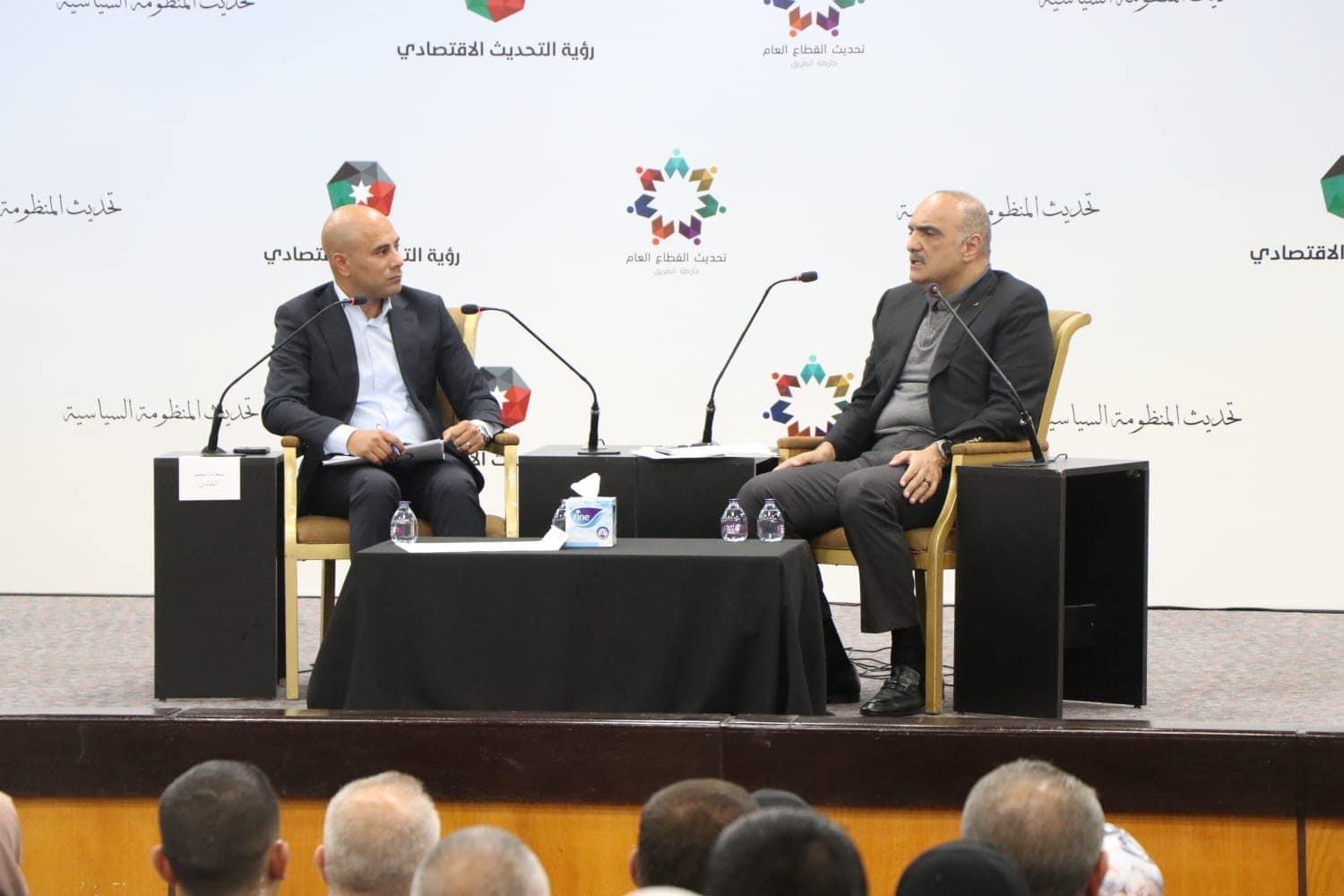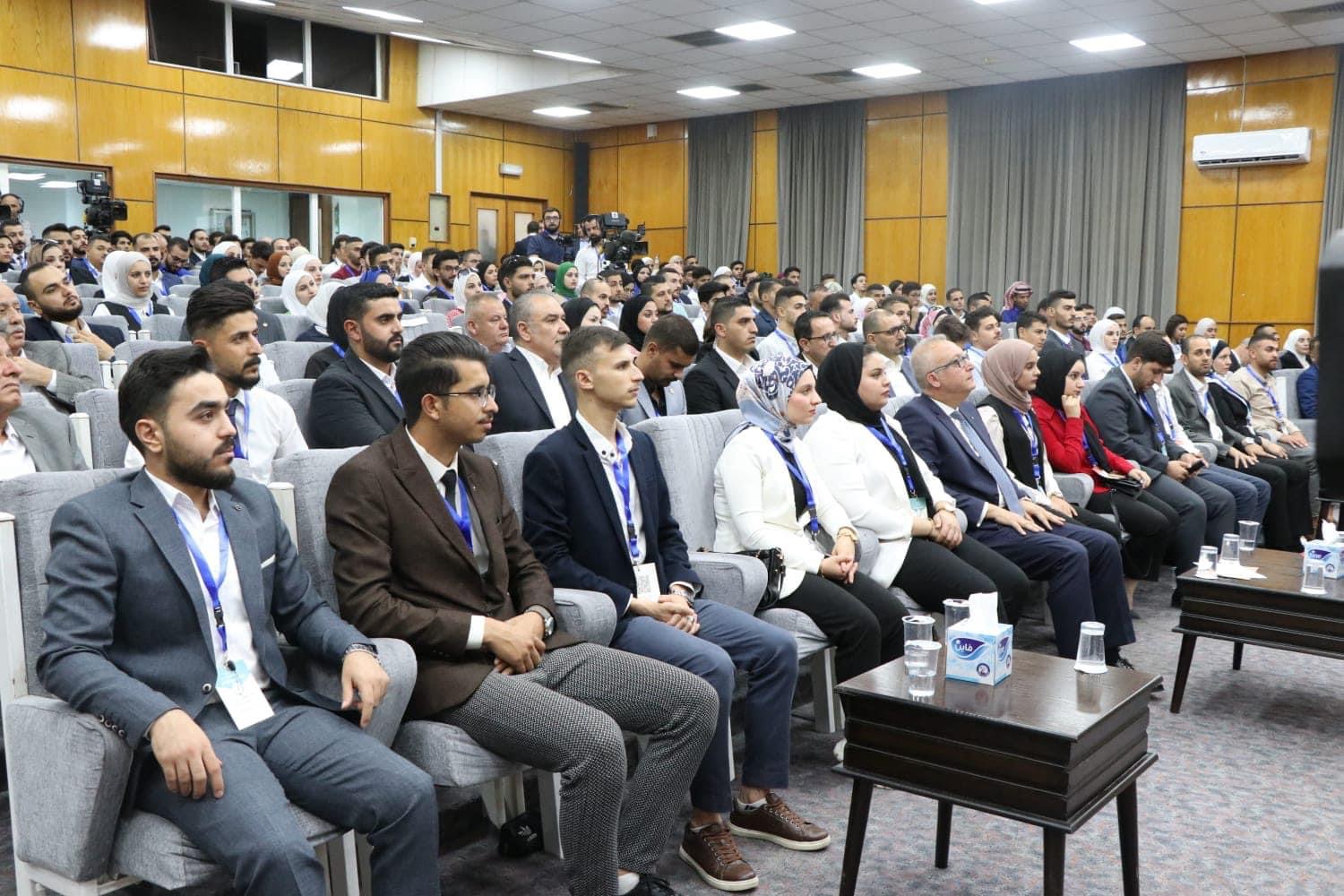
Following up his series of dialogues with young people, the Prime Minister of Jordan, Dr. Bishr Al-Khasawneh, had his third dialogue meeting at Yarmouk University in Irbid Governorate with a huge number of young people from the northern governorates of Jordan under the title: “Visions of Modernization: Youth are the Focus of Attention”.
During the meeting, which was attended by a number of ministers, the president of Yarmouk University, and hundreds of public and private university students from the northern governorates, the Prime Minister affirmed that the state system in its various institutions and executive agencies is the guarantor of fulfilling the vision of His Majesty King Abdullah II by implementing the outputs of the Political System Modernization Committee, which provides the basis for the existence of political and partisan life and is based on parties and political participation.
Al-Khasawneh said: "During my dialogues with young people in the central and southern regions, I clearly felt apprehension about the idea of participating in the partisan life as a result of the prohibitions that prevailed previously, stressing that the recent constitutional amendments and the election and party laws provided clear guarantees to enhance the participation of youth and women in partisan and political life and that there are no longer obstacles for young men and women to engage in that experience”. He also stated: " Students of universities will not be negatively affected due to their participation in political and partisan work, whether they are studying in universities at their own expense or on scholarships at the expense of third parties".
The Prime Minister confirmed that there is a rule of guarantees to protect the political and partisan life in Jordan and that the government will use the law in a deterrent framework against anyone who tries to discourage youth from engaging in the partisan work within the framework of parties that legally correct their status. He then pointed to the existence of a clear determination from His Majesty King Abdullah II and His Highness Prince Al-Hussein bin Abdullah II, the Crown Prince, and from the state with its various components, executive agencies, and security system to encourage the involvement of youth in the partisan work and political life, pointing to the incorporation of concepts related to awareness and encouragement of the practice of the partisan work in school and university curricula for the purposes of breaking taboos and motivating young people to participate in parties.
Moreover, the Prime Minister explained that (70%) of public spending goes under the item of salaries and pensions and about (13.7%) for indebtedness obligations, indicating that despite what is achieved from public revenues, i.e. taxes, aids, and returns from mining industries, there is a gap between revenues and expenditures amounting to about 2 billion Jordanian dinars, which is covered through annual borrowing. He then stressed that Jordan’s economic indicators during the first quarter of this year achieve promising targets that confirm that we are on the right path, as we achieved an economic growth rate of (2.8%), an increase in the volume of national exports (4%), an increase in tourism income (68%), a decrease in unemployment (1%), a decrease in the trade balance deficit, in addition to a historical balance of cash reserves in foreign currencies. He also pointed out that the laws regulating the investment environment provides income tax exemptions of between 30% and 100% for investments that provide job opportunities for Jordanians or investments that are established outside the capital. He then mentioned the launch of the (invest jo) platform that displays the advantages and exemptions granted to investments in addition to the list of projects offered for investment.
In response to questions from young men and women, the Prime Minister confirmed that the government is working on real reforms in the education sector, focusing on tracks related to encouraging vocational and technical education, in addition to the general secondary exam (Al-Tawjihi). Concerning the university education, he indicated that the government is moving towards abolishing the Ministry of Higher Education and assigning its work to the Council of Higher Education, which will gradually result in independent policies for university admission, in addition to addressing the problem of stagnant majors and encouraging required majors in the labor market, such as artificial intelligence, information security, professional and technical specializations, and others. In response to a question about the issue of the Teachers Syndicate, the Prime Minister noted that the case is still considered by the judiciary today, stressing that there are no problems with other professional unions that hold their elections regularly.
Regarding improving the services in the government hospitals, the Prime Minister affirmed that there is a relentless pursuit by the government to improve the health and treatment services starting with Al-Bashir Hospital. He also stressed that the government seeks to cover the lack of medical specializations in government hospitals in the periphery governorates by contracting with doctors and reconsidering the scholarship process, in addition to seeking to improve the infrastructure and hotel services in hospitals, stressing that the quality of medical services provided in government hospitals is very distinguished based on statistics and studies.
Regarding the new city project, the Prime Minister pointed out that it is now undergoing in-depth feasibility studies, in addition to preparing a comprehensive plan, noting that it is not envisaged that the actual work will start before 2025 due to the fact that there is a capital investment in that city’s infrastructure, about (441) million US dollars. Regarding the role of the media, Al-Khasawneh stressed the centrality and importance of such a means of communication, pointing out that there is a lack of understanding of the role of alternative media as a modern tool that took a large part of the role of traditional media in communication. Also, he noted that stopping the application of TikTok in Jordan is related to the issue of responsible content in accordance with the law, pointing out that according to the law there must be a regional or local office in Jordan and this has not been responded to so far.
However, the Prime Minister concluded his speech saying: "I am impressed by the level of awareness among our youth and their sincere desire to move and work to make a difference and change", stressing that the government is working to reproduce credibility between the government and state institutions, on the one hand, and the citizens, on the other hand, through establishing a conscious discourse that shows facts and highlights the gradual political, economic, and administrative plans that extend over years.
The President of Yarmouk University, Professor Islam Massad, confirmed that the University is an incubator for various activities and events, a translation of the visions and directives of His Majesty King Abdullah II and His Highness Prince Al-Hussein bin Abdullah II, the Crown Prince, and their directions and plans in the areas of political, economic, and administrative modernization. He also pointed out to the activities of the second season of Yarmouk’s Youth Summer 2023, which involve inviting several community personalities to have a dialogue with University students. Finally, Massad drew attention to the University's ambitious plan to establish partnerships with the private sector to implement many projects and investments belonging to the University.




